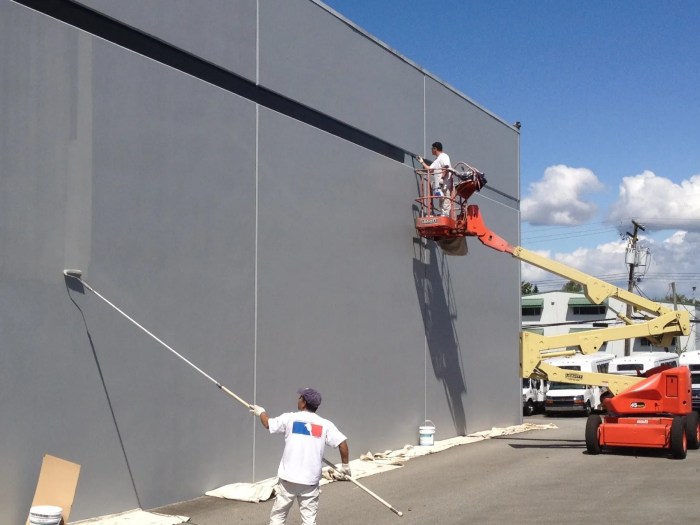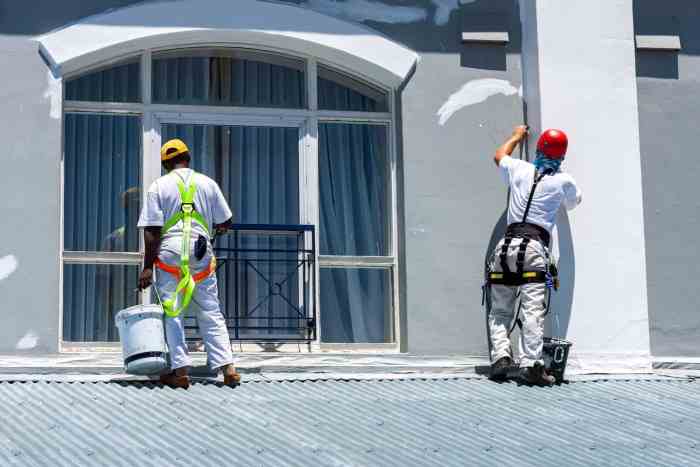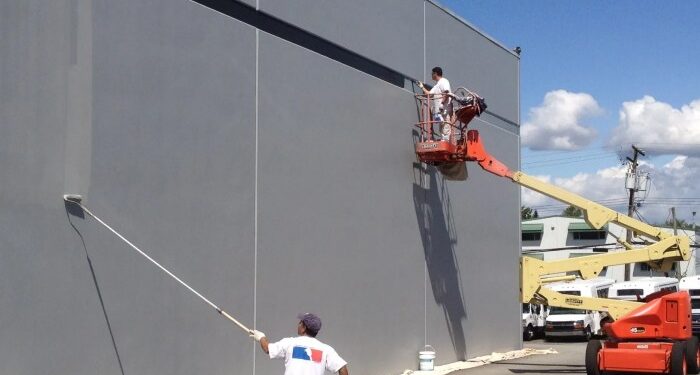Exploring the realm of commercial painting contractors, this introduction delves into the crucial role they play in transforming spaces with precision and expertise. From the intricate details of their work to the impact they have on diverse projects, this narrative sets the stage for an enlightening journey into the world of commercial painting contractors.
Understanding Commercial Painting Contractors

Commercial painting contractors specialize in providing painting services for various commercial properties such as offices, retail stores, restaurants, and industrial facilities. These professionals are trained and experienced in handling large-scale painting projects efficiently and effectively.
Importance of Hiring Professional Commercial Painting Contractors
Commercial painting contractors bring a level of expertise and skill that ensures high-quality results and a professional finish. They have the necessary equipment, tools, and knowledge to tackle complex painting projects in a timely manner. By hiring professional contractors, you can save time and resources while achieving a superior outcome.
Typical Services Offered by Commercial Painting Contractors
- Interior and exterior painting
- Surface preparation and repair
- Color consultation and selection
- Specialized coatings and finishes
- Pressure washing and cleaning
- Project management and scheduling
Examples of Commercial Painting Projects Requiring Professional Contractors
- Painting a large office building with multiple floors
- Painting a retail store with specific branding colors and designs
- Applying protective coatings on industrial equipment or machinery
- Refurbishing the exterior of a restaurant with intricate detailing
Qualifications and Skills
Becoming a successful commercial painting contractor requires a combination of qualifications and skills that are essential for excelling in the industry.
Essential Qualifications
- A high school diploma or equivalent is typically required to start a career as a commercial painting contractor.
- Apprenticeship programs or vocational training in painting and coating application can provide valuable hands-on experience and knowledge.
- Some states may require commercial painting contractors to obtain a license to operate legally.
Skills Required for Success
- Attention to detail: Commercial painting contractors must have a keen eye for detail to ensure quality work.
- Physical stamina: Painting involves long hours on your feet and working with your hands, so good physical condition is essential.
- Color matching and blending: Being able to mix and match colors accurately is crucial for achieving the desired results.
- Knowledge of painting techniques and tools: Understanding different painting techniques and how to properly use tools is vital for efficiency and quality.
Importance of Certifications and Licenses
- Certifications such as those from the Painting and Decorating Contractors of America (PDCA) can demonstrate expertise and professionalism in the field.
- Licenses ensure that commercial painting contractors meet certain standards and regulations set by state or local authorities.
- Having the necessary certifications and licenses can also instill trust and confidence in clients, helping to attract more business.
Tools and Equipment

Commercial painting contractors rely on a variety of tools and equipment to successfully complete their projects. From traditional painting tools to modern technology, having the right equipment is crucial for achieving high-quality results.
Common Tools and Equipment
- Paintbrushes and rollers: Essential for applying paint to surfaces.
- Spray guns: Used for painting large areas quickly and efficiently.
- Drop cloths and masking tape: Protect surfaces from paint splatter and ensure clean lines.
- Sanding tools: Used to prepare surfaces by smoothing out imperfections.
- Ladders and scaffolding: Necessary for reaching high areas safely.
Traditional vs. Modern Painting Equipment
While traditional painting tools like paintbrushes and rollers are still widely used, modern painting equipment has revolutionized the industry. Airless spray guns, for example, allow for faster application of paint and a smoother finish. Additionally, digital color matching tools help contractors accurately match paint colors for a seamless result.
Safety Equipment
- Protective clothing: Including coveralls, gloves, and goggles to protect against paint splatter and fumes.
- Respirators: Essential for protecting against inhaling paint fumes and other harmful chemicals.
- Fall protection gear: Such as harnesses and safety lines for working at heights.
- Fire extinguishers: To ensure safety in case of emergencies.
Project Management
Project management is a crucial aspect of commercial painting projects, ensuring that the work is completed efficiently, on time, and within budget. Commercial painting contractors follow a typical process to manage a project effectively, from initial planning to final execution.
Estimating Project Costs and Timelines
Commercial painting contractors estimate project costs and timelines by considering various factors such as the size of the project, the type of surfaces to be painted, the quality of paint and materials required, and the labor costs involved. They also take into account any additional services needed, such as surface preparation, repairs, or special coatings.
By analyzing these factors thoroughly, contractors can provide accurate estimates to clients and create realistic timelines for project completion.
- Factors considered when estimating project costs and timelines include:
- Size of the project
- Type of surfaces to be painted
- Quality of paint and materials
- Labor costs
- Additional services needed
Accurate estimation of project costs and timelines is essential to avoid delays, cost overruns, and unsatisfied clients.
Importance of Project Management Skills
Project management skills are crucial for the successful completion of commercial painting projects. Effective project management ensures that timelines are met, resources are utilized efficiently, and communication with clients and team members is clear and consistent. Without strong project management skills, commercial painting projects may face delays, budget overruns, and quality issues.
- Key project management skills for commercial painting contractors include:
- Planning and organizing
- Time management
- Resource allocation
- Communication
- Problem-solving
Ultimate Conclusion

In conclusion, the realm of commercial painting contractors is a vibrant tapestry of skill, precision, and creativity. Their ability to breathe new life into spaces and elevate aesthetics is unmatched. As we wrap up our discussion, the essence of their work lingers, reminding us of the artistry and dedication that define this profession.
FAQ Insights
What services do commercial painting contractors offer?
Commercial painting contractors provide services such as interior and exterior painting, surface preparation, color consultations, and specialty finishes.
What qualifications are necessary to become a commercial painting contractor?
Essential qualifications include proper training, knowledge of painting techniques, attention to detail, and the ability to work efficiently.
How do commercial painting contractors estimate project costs?
Contractors typically consider factors like surface area, materials needed, labor costs, and any additional services required to provide an accurate project cost estimate.













